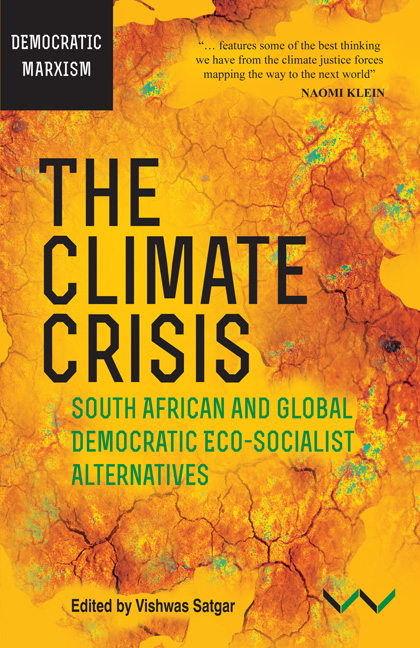Book contents
- Frontmatter
- Contents
- Tables and Box
- Acknowledgements
- Acronyms and Abbreviations
- Chapter 1 The Climate Crisis and Systemic Alternatives
- PART ONE THE CLIMATE CRISIS AS CAPITALIST CRISIS
- PART TWO DEMOCRATIC ECO-SOCIALIST ALTERNATIVES IN THE WORLD
- PART THREE DEMOCRATIC ECO-SOCIALIST ALTERNATIVES IN SOUTH AFRICA
- Chapter 10 The Climate Crisis and a ‘Just Transition’ in South Africa: An Eco-Feminist-Socialist Perspective
- Chapter 11 Energy, Labour and Democracy in South Africa
- Chapter 12 Capital, Climate and the Politics of Nuclear Procurement in South Africa
- Chapter 13 Climate Jobs at Two Minutes to Midnight
- Chapter 14 Deepening the Just Transition through Food Sovereignty and the Solidarity Economy
- Chapter 15 Eco-Capitalist Crises in the ‘Blue Economy’: Operation Phakisa's Small, Slow Failures
- CONCLUSION
- Contributors
- Index
Chapter 11 - Energy, Labour and Democracy in South Africa
from PART THREE - DEMOCRATIC ECO-SOCIALIST ALTERNATIVES IN SOUTH AFRICA
Published online by Cambridge University Press: 05 June 2019
- Frontmatter
- Contents
- Tables and Box
- Acknowledgements
- Acronyms and Abbreviations
- Chapter 1 The Climate Crisis and Systemic Alternatives
- PART ONE THE CLIMATE CRISIS AS CAPITALIST CRISIS
- PART TWO DEMOCRATIC ECO-SOCIALIST ALTERNATIVES IN THE WORLD
- PART THREE DEMOCRATIC ECO-SOCIALIST ALTERNATIVES IN SOUTH AFRICA
- Chapter 10 The Climate Crisis and a ‘Just Transition’ in South Africa: An Eco-Feminist-Socialist Perspective
- Chapter 11 Energy, Labour and Democracy in South Africa
- Chapter 12 Capital, Climate and the Politics of Nuclear Procurement in South Africa
- Chapter 13 Climate Jobs at Two Minutes to Midnight
- Chapter 14 Deepening the Just Transition through Food Sovereignty and the Solidarity Economy
- Chapter 15 Eco-Capitalist Crises in the ‘Blue Economy’: Operation Phakisa's Small, Slow Failures
- CONCLUSION
- Contributors
- Index
Summary
The issue of climate change ‘changes everything’, to use Naomi Klein's (2014) pithy meme, and requires a fundamental shift in the way in which we extract, produce, subsidise, distribute and consume – in short, the way in which we live. The devastating role that the extraction and use of fossil fuel energy has played on the natural and social world – whether through climate change, habitat destruction, environmental racism or the environmentalism of the poor – has received considerable and important attention (e.g. Bond 2004; Hargreaves 2014; Klein 2014; Kovel 2003; Mitchell 2011; Nixon 2012; Sachs 1999). In this chapter, I take a different angle and look at the link between energy, labour and democracy.
One of the hidden stories behind the organisation of the global economy is the way in which powerful economic forces have shaped democracy for the past 150 years. In this chapter, I argue that the issue of energy is integrally linked to democracy. The link between nature and democracy occurs through the way in which mega corporations, most importantly in the energy sector, shaped (and continue to shape) politics and economics in the twentieth century. The sourcing, processing, distributing, subsidising and consuming of energy governs the way in which we live, the way in which we are governed and the way in which we organise our economy, including the way we produce and consume. After reviewing the global shift from coal to oil and the implications for democracy, I look at the South African experience of coal energy and democracy. I conclude by looking at the potential role of renewable energy for democratising democracy.
ENERGY AND DEMOCRACY
The connection between energy production and democracy cannot be understated. The social relations surrounding energy have changed over time from an early period in which waterwheel energy allowed labour a degree of power (Malm 2013) to the transition to coal, in which its labour demands further opened space for democratic claims to a context in which labour's power eroded as corporates centralised power with the shift to oil and technological developments in the coal sector (Mitchell 2011).
- Type
- Chapter
- Information
- Climate Crisis, TheSouth African and Global Democratic Eco-Socialist Alternatives, pp. 231 - 251Publisher: Wits University PressPrint publication year: 2018



